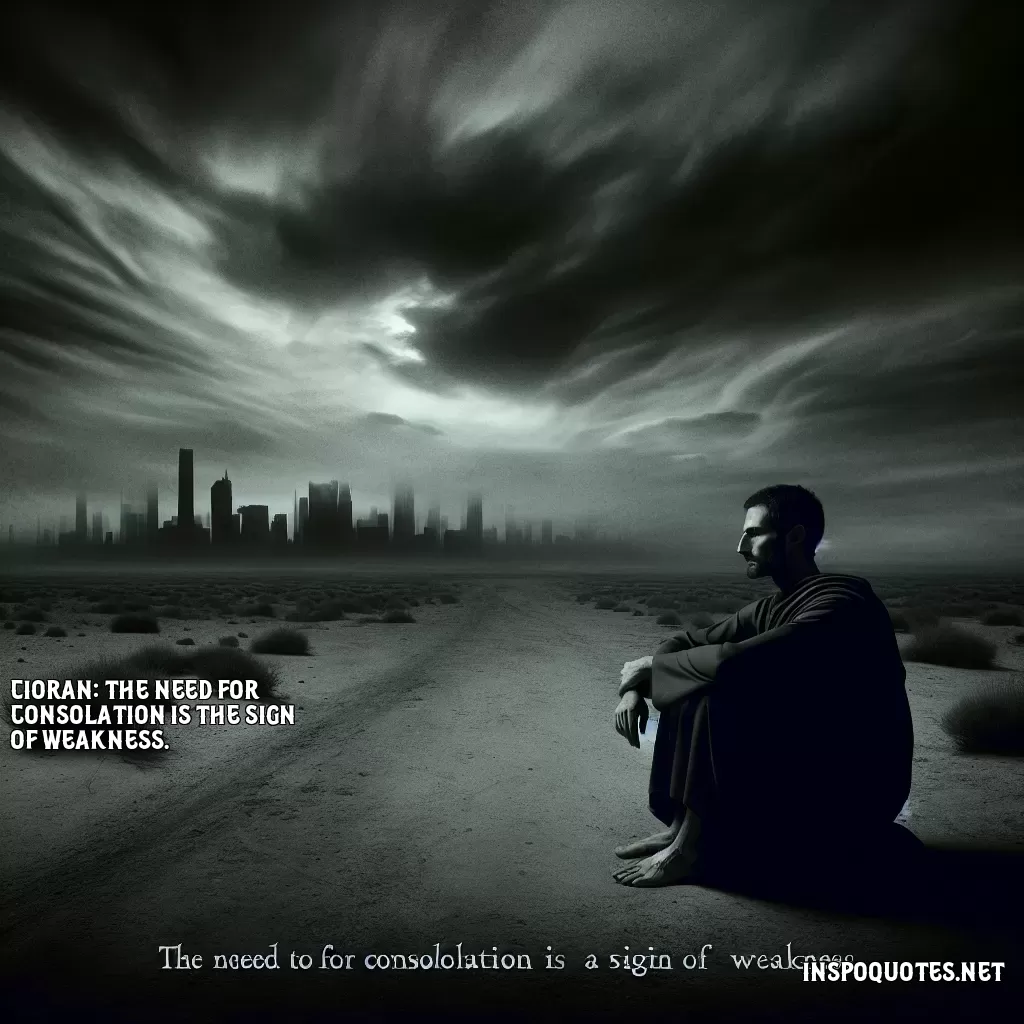
Cioran: The need for consolation is the sign of weakness.
Author: Emil Cioran
👁️ 16 views
Emil Cioran, a Romanian philosopher known for his works on existentialism and nihilism, made a thought-provoking assertion with the quote: "The need for consolation is the sign of weakness." To unpack this, we must first consider what is meant by "consolation." Consolation is comfort received after a loss or disappointment, a way of alleviating grief, anxiety, or distress. In everyday life, seeking consolation is often perceived as a natural human response to adversity or emotional pain. Cioran, however, challenges this notion by suggesting that the act of seeking consolation reveals an inherent weakness. This perspective is deeply rooted in existentialist and nihilistic thought, which often emphasizes the absurdity and indifference of the universe. From a Cioranian view, seeking solace from external sources implies a dependency or a lack of self-sufficiency. It may denote an inability to confront and accept the harsh realities of life on one's own terms. By labeling the need for consolation as a weakness, Cioran might be arguing for a form of existential fortitude. He could be advocating for embracing the solitude of human existence and finding strength within oneself rather than relying on external affirmations or comfort. This interpretation aligns with existentialist themes that prioritize personal responsibility in creating meaning and coping with life's inherent meaninglessness and suffering. It's important to note that this perspective, while intellectually stimulating, is subjective and open to criticism. Many may argue that seeking consolation is a sign of vulnerability, not weakness, and that it is an essential part of the human experience that contributes to emotional resilience and healing. Thus, Cioran's quote invites us to reflect on our own views regarding human vulnerability, strength, and the nature of dependency.
Quote By: Emil Cioran
Emil Cioran was a Romanian philosopher and essayist, born on April 8, 1911, in Rășinari, a small village in Transylvania. His early life was steeped in a culture rich in folklore and the Orthodox Christian tradition, which would later influence his existential musings. Cioran was educated in the city of Sibiu, where he studied philosophy and literature. He later moved to Bucharest, immersing himself in the vibrant intellectual milieu of the time, where he became associated with the Romanian avant-garde.
After the tumultuous years of World War II and with the rise of Communism in Romania, Cioran eventually decided to leave his homeland in 1941. He settled in Paris, where he would spend the rest of his life. This move marked a significant turning point in Cioran's life and work; he became increasingly disenchanted with the world, a theme prevalent in his writings. In Paris, Cioran's unique voice emerged, characterized by a profound sense of pessimism and a sardonic wit. He wrote primarily in French, transcending linguistic barriers and earning recognition in literary circles across Europe.
Emil Cioran's philosophical writings explored themes of despair, nihilism, and the absurdity of existence. His most notable works include "On the Heights of Despair" (1934), "The Trouble with Being Born" (1973), and "A Short History of Decay" (1949). In these texts, Cioran grapples with the struggles of human existence and the futility of life, reflecting his belief that suffering is an inherent part of the human condition. His aphoristic style and incisive observations have continued to resonate with readers, earning him a place among the great existential thinkers of the 20th century.
Cioran's literary contributions are marked not only by their philosophical depth but also by their striking lyrical quality. His works challenge the reader to confront uncomfortable truths about life, death, and the often absurd nature of existence. Emil Cioran passed away on July 20, 1995, in Paris, leaving behind a rich legacy that continues to inspire philosophical inquiry and literary exploration. His insights remain relevant today, as they articulate the complexities of human emotional experience with a clarity and poignancy that few have matched.